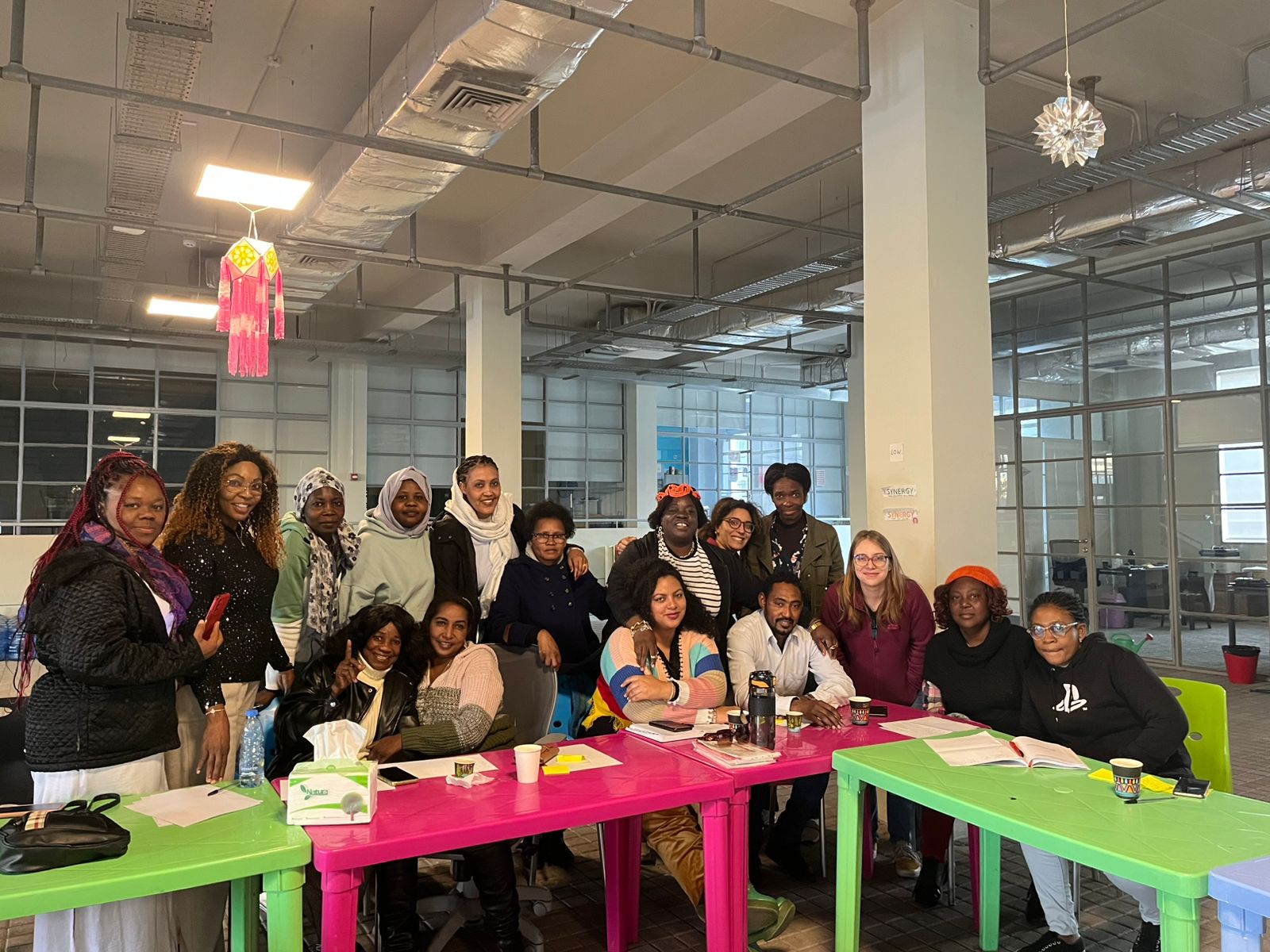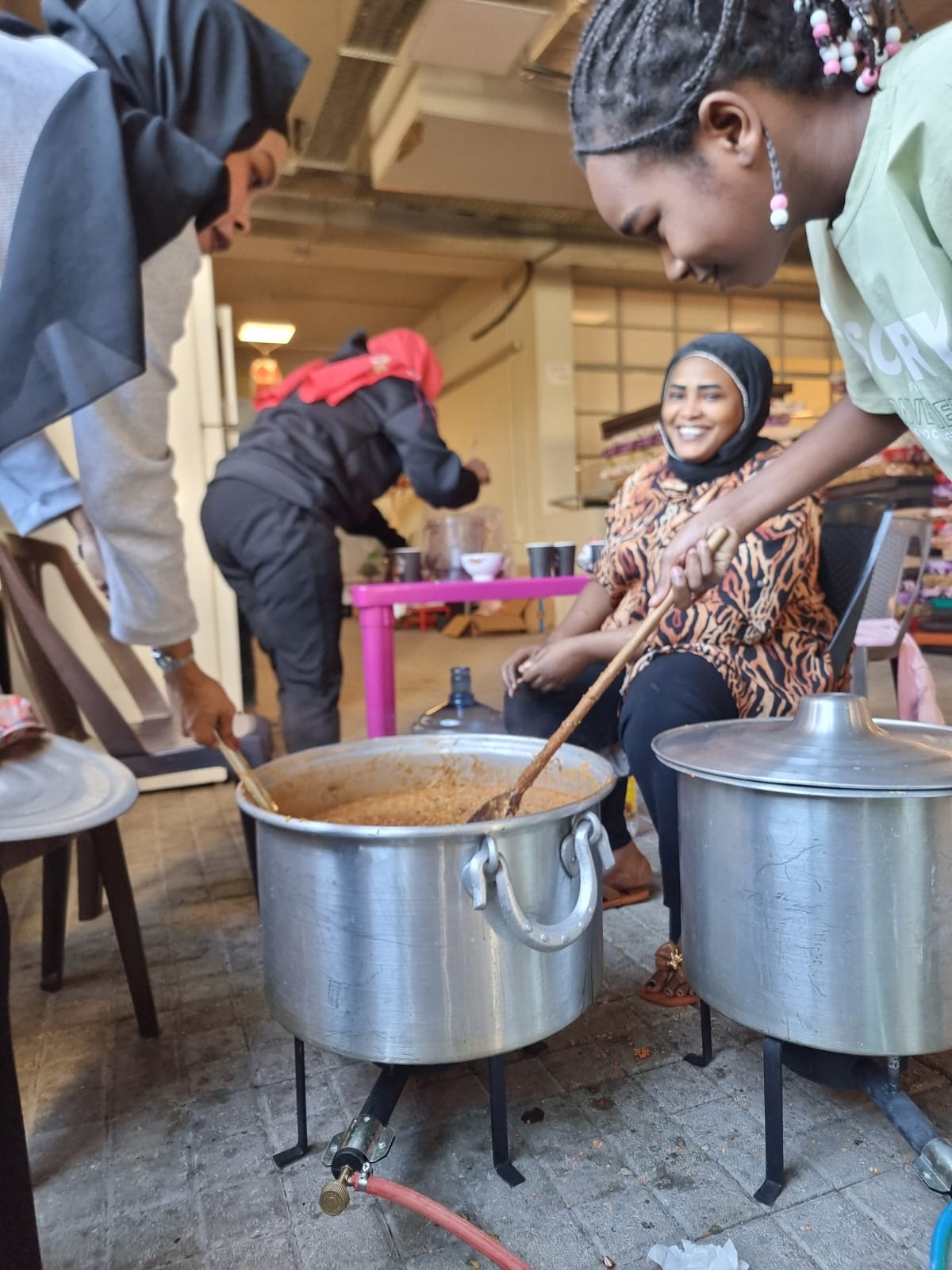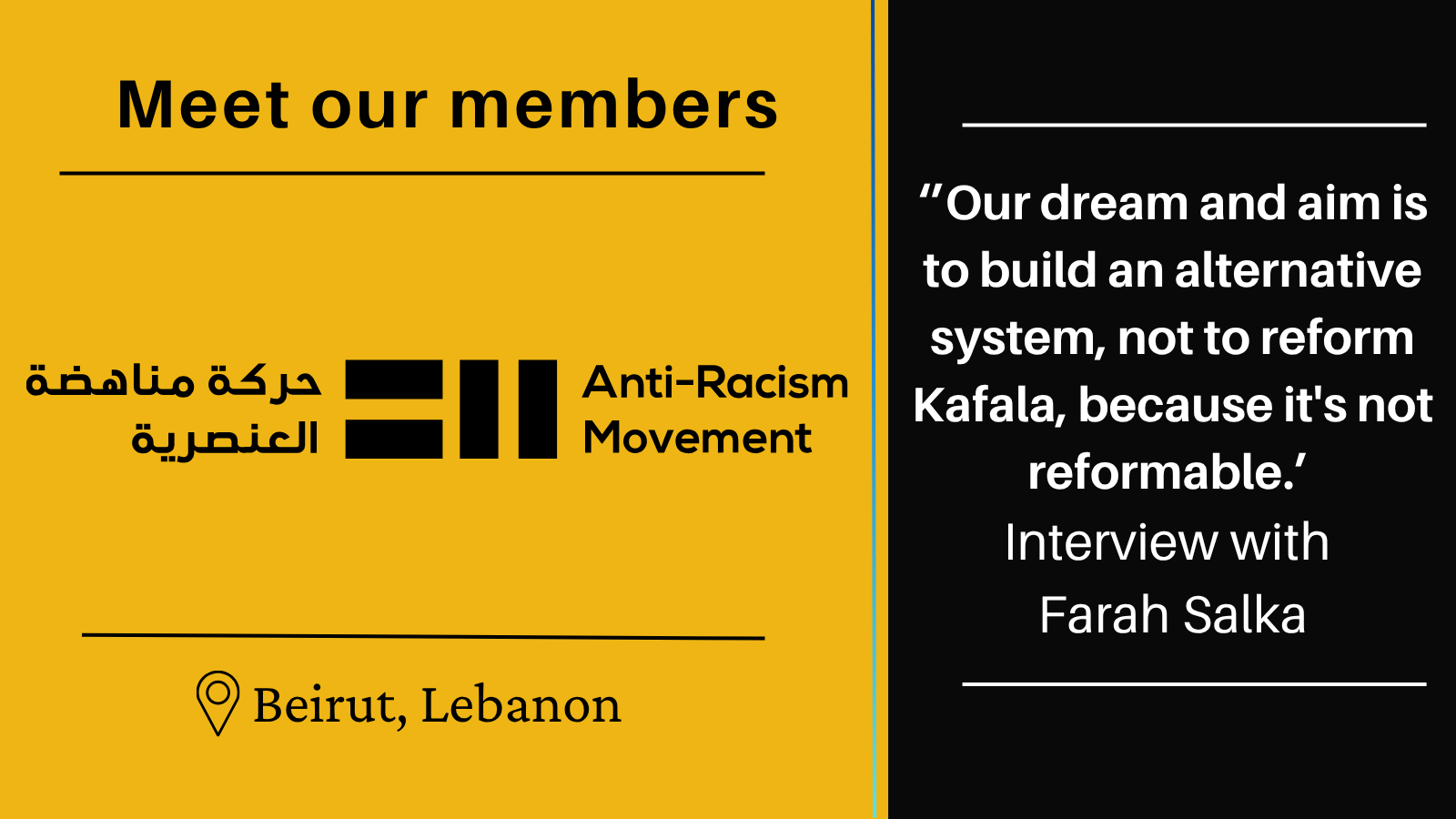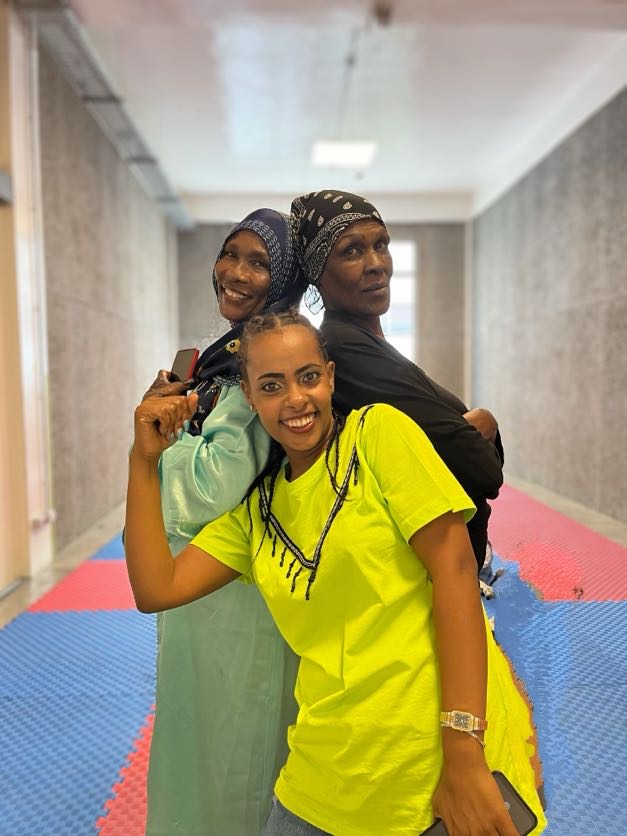This article is an interview with Farah Salka, the Co-Director of the Anti-Racism Movement (ARM), Lebanon. Launched in 2010, ARM began as a grassroots collective of Lebanese feminist activists and migrant domestic workers living in Lebanon. They are one of few organisations in Lebanon focusing specifically on migrant workers. Their theory of change shifts the positionality of migrant workers from“beneficiaries” to leaders and agents of change, taking a migrant-centered and feminist approach throughout their programming.
Vivian: Thank you, Farah, for joining in today's interview. I would like to understand more about the history of the Anti-Racism Movement (ARM) and why it was founded.
Farah: Right, well ARM, which is short for the Anti-Racism Movement, was launched in 2010, about 15 years ago. We began as a grassroots collective of feminist activists that included migrant workers, migrant domestic workers, and local activists of different nationalities who were born or based in Lebanon. We worked a few years informally until we got registered in 2012.
That was the case 15 years ago, but even now some are unable to register their organisations. ARM is one of the very few actors, if not the only one, that is focusing specifically on working and organising with women migrant workers, and even one of the fewer organisations that works in the particular way that we work, which is long term sustainable change, as opposed to just small projects here and there.
We do a lot of things at ARM, but our main mandate is working towards abolishing the Kafala system, which is the sponsorship system in Arab countries. Our dream and aim is to build an alternative system, not to reform Kafala, because it's not reformable. We want to abolish it. We want to build an alternative system and future for migrant workers in the country.
As I already mentioned, our focus is on working with migrant domestic workers, specifically, migrant workers, like men migrant workers, who are completely off the agenda of any organisation. We work with families, not just women, and cater to the needs of migrant workers.
Our theory of change focuses on shifting the positionality of migrant workers from beneficiaries or recipients of help, aid, or projects to leaders and agents of change in their own struggle, with the support of whatever they need from Lebanese anti-racist activists. We are migrant-centred and adopt a feminist approach in all our programmes despite multiple challenges. Obviously, it's not a piece of cake but that is the essence of how we do things.
Vivian: Could you tell me more about these sustainable or long-term changes, and how they incorporate the experience and voices of migrant domestic workers?
Farah: First, ARM’s vision is for a just society where migrants have decent living and working conditions. Our mission is to achieve a just society through social, economic, and gender justice for racialised groups and migrant workers in Lebanon. We work towards our objectives by advancing structural changes against racism in Lebanon. It means that we are focused on achieving incremental changes that may take decades of work.
Second, we strengthen and support migrant communities and groups to self-advocate and take collective action. This is where there's a bit of a distinction between our work at ARM and our work at the Migrant Community Centre (MCC).
Our third objective is to create a healthy, well-functioning and sustainable organisation. Here I'm referring to ARM, so it means that without ARM, there's no MCC, and without MCC, there's no ARM. Sometimes people get confused and they think that there are two organisations: ARM and MCC. Practically speaking, there's one NGO, which is ARM – where we do most of the things, invest most of our time, resources, and our staffing. The MCC does other things like advocacy, casework, fundraising, etc.
For context, right now the team size has fluctuated between 15 and 40. During the last six years of extreme crises in Lebanon, I think we were around 28, but at the maximum, we've been 40. Ideally, a team size in the twenties would be most suitable, given the scale of operations that we can manage. We also have volunteers and interns coming in and out, and there are almost a thousand registered members at the MCC at the moment.
Vivian: Okay, it's a medium sized team and an operating office.
Farah: Yes, I have tried to give you an idea of our approach, work and beliefs.
We also have a duty to build stronger communities within the larger migrant community, regardless of the challenges. We believe strong communities are able to support and represent themselves politically than any NGO or Lebanese group could. No matter how much you pursue, you cannot abolish Kafala without migrant workers being at the forefront. And I don’t mean just throwing them out there. That would mean a 100% risk of them getting detained and deported. A very delicate balance has to be maintained, otherwise you're not going in the right direction. I would also like to add here that the way we are doing it is not necessarily the fastest way to abolish the Kafala system. It's going to take a hundred years maybe. Abolishing Kafala is not like the pure, dry, dead outcome that we want. What is equally important is the way we pursue our objective.

Influencing narratives and enhancing understanding is a vital step in changing attitudes and beliefs. This is why we also invest a significant amount of time doing that. To give an example, we took the help of our allies in the media to assist migrant workers build their own media for sharing their narratives and stories. Tomorrow, we are having a very big event at MCC with around a hundred people coming, all to meet and mingle and learn about the collective.
We also believe that structural change will improve the situation of migrant domestic workers in Lebanon, and it will have a ripple effect in the region as well. If there are successes in Lebanon, and we're talking about the region that is rife with all sorts of models of Kafala, then this will have a trickle-down effect. The list is long, so we believe that working on individual behaviours and structures will go a long way in achieving our mission. However, it's not just about changing the way this one random employer is treating migrant workers at home, but it is the sum of all parts. We need to be constantly looking at the bigger picture to be able to achieve what we want.
And the last point that I want to add here is about benefitting from a healthy, well-functioning, sustainable organisation. As I mentioned earlier, this is our third objective. For us, it's very important to be clear and intentional about our need to invest in ARM as an organisation. Why is it important to invest in ARM and be very clear about it? Because we believe in building culture and working with people who are political and aligned with our values. We train people to be amazing at accounting, but they may have no idea what ARM is working on. We need to have a learning culture al atl the time, and we work towards that by improving our internal processes, investing in the right staff, their well-being, constant brainstorming, and finding ways of becoming more self-sustainable. The idea is not to falter at the first hint of crisis, because it seems that crises are here to stay in this part of the world.
Vivian: That’s very comprehensive, Farah, and I have many questions, but I'll start with this process of abolishing Kafala, which is one of the main goals of ARM. I would like to know more on how the MCCs came to be a big part of this process. You mentioned there are about 1000 members. How do these members come to these centres? How do they know about ARM and get involved or really engage with you? We know that being a migrant, a worker, but also then organising – it requires time that they don’t usually have. And probably there is fear, because of the many restrictive laws, fear of discrimination and deportation. So how do they manage to keep themselves involved in these MCCs and this process of abolishing Kafala?
Farah: Yes, you’re right, and there's no one right answer for these questions. There are various ways through which people learn or get to know about MCC and there are also many different ways for them to be involved. The profiles of migrant workers who come to the centres or to ARM’s operations and engagements are different. For example, before the opening of the first MCC in 2011, we were already working with migrant workers. We had learning sessions; we were a group of feminist activists within a feminist collective, interested in the anti-racism issue and what was happening in Lebanon at the time and how migrant workers were being treated.
Naturally, many migrant workers began to join this particular group within the bigger feminist collective. And the more our conversations and friendships developed, the more curious we were to know, to understand, and to dissect. We went with migrant workers to their whereabouts during the day, whether they were going to a police station or to handle a case, or to a hospital or prison. We started seeing and understanding things just by being there. That is when we opened the first MCC because migrant workers who we were talking to needed so many things.
Wanting to have a space of their own topped the list. They needed a space to meet without conditions, without employers, without having to pay, without having it to be a religious space, or being framed in any shape or form. They wanted to use the space in multi-purpose ways. Some migrant workers just wanted to go and sit there without being told what to do. Others, to use the space to cook without having someone telling them that the smell of their food is annoying. Some came because they didn't want to have to go to church, or they didn't want to have to go to a Lebanese cafe where they could be harassed. Some people wanted a space to organise a wedding. Some wanted a space to take their children to because they didn't know where to take them. Some wanted specific activities to do on a day, like learning English or how to use a computer. That’s why we opened the first space in 2011.

We've done different forms of outreach, but we’ve had to stop doing outreach because right now there are 1000 members and we cannot register more. We can’t run a bigger space with a small number of staff, so it's a constant struggle. That being said, the short answer is, word of mouth. If a migrant worker comes to this space and believes in the mission of ARM, trusts the people there, finds people from her community, she will come back and will always come back with a friend.
There are people who don't know about MCC. They come to speak to one of our case workers because they need help. The case worker tells them about MCC, or they discover MCC when they visit us.
There are other things happening as well. In the last 10-15 years of work, we noticed that many of the members eventually travel or go back home or find asylum, usually with our help. We’re always happy when people manage to do that. Sometimes they find other more decent places to travel to and live in. We have parties, we say goodbye. New people and members come in. We have some members who have grown up at MCC. When we started, maybe 15 years ago, there were lots of children. These children are now teenagers, and this impacts our activities and operations. We now have to take them into account too and work with them specifically.
Vivian: Right. You also mentioned there are many challenges. I just want to focus once again on these migrant community centres. Is the legal advice or counsellor that you mentioned, provided within that space? What are the services provided there? Is it run by ARM staff or by migrant domestic workers, or migrant workers in general?
Farah: The staff is a combination of Lebanese and migrant workers. We've had times where the ARM office and MCC offices were separated, but right now that's not the case. We are all in one very big space – ARM staff, MCC staff, the centre, the space, and the community kitchen, they're all in one big space.
Basically, it is illegal to hire migrant workers in Lebanon to do the work that we do. So, if you need to do it, you have to go an extra mile to be able to do it in a way that doesn't jeopardise the work. The last thing you need is police visiting your centre. There are dynamics you discover with time; sometimes there are lots of dynamics and tensions within the community itself.
Vivian: Being more specific, what does this community centre offer? Are there any workshops, trainings, or is it just a space where they can come together?
Farah: The MCC is a very lively and dynamic place. It's constantly buzzing with all sorts of activities. Every day is different. There are days when we have computer classes, yoga classes, and there's a day where there is graduation, sometimes a birthday. There are even psychosocial support activities of different sorts. On weekends, there are beach and ski trips. This is for migrant workers and members in general.
And then you have the migrant activists, who have a very different outlook and also a list of needs. Migrant activists use the space to develop skillsets and need staff to support them. They need training on organising, digital security, and writing statements. Sometimes, they also need support in translation.
Vivian: Right, there are different needs and aspects in each group. Coming back to the challenges that you mentioned before. You started saying that ARM doesn’t want to reform but abolish the Kafala system, which is even stronger and more difficult work. But for that you may have to pay attention to the whole system – including the society, to have a better picture. What are the main challenges that you face during this process of trying to abolish the Kafala system?
Farah: Well, a lot of the work that we do is considered illegal, because we're organising with migrant workers, who at the same time are organising with Kafala workers in Lebanon. Kafala workers are not meant to be doing anything but work. They're not meant to be protesting, or unionising, or changing the system, or dreaming of a different system, or holding the Lebanese government accountable, or holding their own governments accountable. They're not meant to be doing any of this. They're just meant to be working as washing machines in Lebanon, as silently as possible, without having to disturb the status quo or the holders of the status quo.
There are lots of non-Lebanese activists here, mostly Palestinian and Syrian. They have few privileges. However, with the combined strength of Lebanese and Arab activists and staff, we are able to assert our rights as Lebanese people, who cannot be thrown out of Lebanon, to continue the struggle. Despite this, we don't know whether we're going to be able to hold the fort and strengthen the movement and be active leaders in the anti-racism feminist movement in Lebanon.
Unfortunately, migrant workers are dying, they are being killed. Around 100 migrant workers, just migrant domestic workers, die in Lebanon every year, and you can do the math of the last twenty years. These are the official numbers, these are not our numbers – probably my numbers would be higher than this. There are migrant workers who have been thrown out or fallen from balconies due to the challenges and harassment in the workplace.
Building and organising is part of our work. And this is how we are able to get the migrant workers, with all the challenges and the different layers of victimisation and marginalisation that they experience in Lebanon, to rise from the ashes and speak up. Their voices and energies are invested in the process of working towards abolishing Kafala. They are not just sitting there waiting for us to abolish it for them. Our responsibility is to keep creating spaces to brainstorm and regenerate ideas on how we do this creatively and in alignment with our values. How do we translate our feminism into actual day-to-day practices as we continue to work towards abolishing this system?

Vivian: Those are huge challenges. I didn't think they would be as big as that. And now I understand why it's a process that goes very slowly. In this continued work, does ARM also partner with other organisations? Is there anyone else to partner with, or is it just you taking the lead in Lebanon?
Farah: We would love to work with other organisations. Unfortunately, we do not work with many. We have tried to work with almost every organisation in the last 15 years, but we have very particular politics, positions and values. So it's been really hard to find like-minded organisations. Some talk about just fixing the optics of Kafala, as opposed to uprooting it. They decide how migrant workers' lives should be, but they don't have migrant workers in the room. Some people think we are toxic because we don't want to work with them, but we don't want to work with them for good reasons. That being said, there are new emerging groups in the last few years that are doing good work. We are very happy to know of their existence and looking forward to working with them.
ARM has been active for 15 years. But at the beginning, ARM used to be seen as this new group of leftists, too feminist, too loud, etc. That perception has changed now, because now we are one of the important and oldest players working with migrant workers in Lebanon.
MCC has always been a hub where migrant workers come, do their classes, courses, training, capacity building sessions, and then they emerge and start their own activities. Some people work on advocacy, others work on collaborations of every kind. These are the people with whom we are extremely aligned. We're in the same boat, basically.
Vivian: I understand it is difficult to compromise ARM’s principles and values in order to work with any other organisation. As an alliance, we also understand this. In this regard, I would like to know, how do you see ARM’s work in the future? I mean, what will be your goals in the coming years?
Farah: In the case of ARM, we don't have new projects or new ways of working. We are using the same tools. What we do is to revise our strategy every few years, but our work is so long term that we don't know what it’s going to look like in the coming years. What ARM is going to do in 2026 is to continue the work we're doing right now, which is case work and advocacy. Obviously, the advocacy campaigns change over time, but our advocacy work is constant.
We've been working on organising with freelance workers for the last few years, and now we're evaluating and closing down this chapter after four years. Based on our findings, we decide how to move forward. We've been organising with migrant domestic workers who are within the Kafala system, but they live outside and not in their employers’ homes. Together with them, we’ve been working on the workers’ manifesto, minimum wages, conditions that they see and want to change. We basically train them to negotiate and to lead their own struggle.
There are hundreds of workers in this campaign, and this is where we’ve been invested in the last few years. Also, in the last few years during the war, we had a big campaign where we were putting pressure on the IOM and other mandated organisations to level up and open shelters for migrant workers, because they were stranded on the streets.
Vivian: Right, it is a strong community process and commitments. My last question is also related to this networking, and the nature of these networks. I would like to know what ARM actually thinks are the strengths or benefits of participating in a space such as GAATW?
Farah: I already spoke to you about our local engagements, but internationally and regionally, to be honest, I think GAATW has always been one of the rare groups where we feel like we are with the right people in the room. We are with very like-minded people and organisations. We're not in a room with red flags all over, it's actually a lot of green flags. We have been through so much and so many crises in the last six years that we’ve been forced to be distanced. We couldn't travel and we couldn't do lots of things. We're looking forward to changing that. Spaces like GAATW are places where we feel we can be safe, to be who we are, to think and talk together, to thrive and to imagine possible futures for the communities that we're working with.
We need to have inspiring spaces; we don’t have many here. I think GAATW is on the top of the list of groups and alliances that we feel are proper friends, comrades and activists that we can organise and think with. So that's very much needed for us.
Vivian: Thank you very much for those words. I want to highlight the idea of safe spaces that you mentioned, because even though I've done many interviews and spoken to many members, this idea of safe spaces is new and significant. I really appreciate it. Thank you, Farah!


